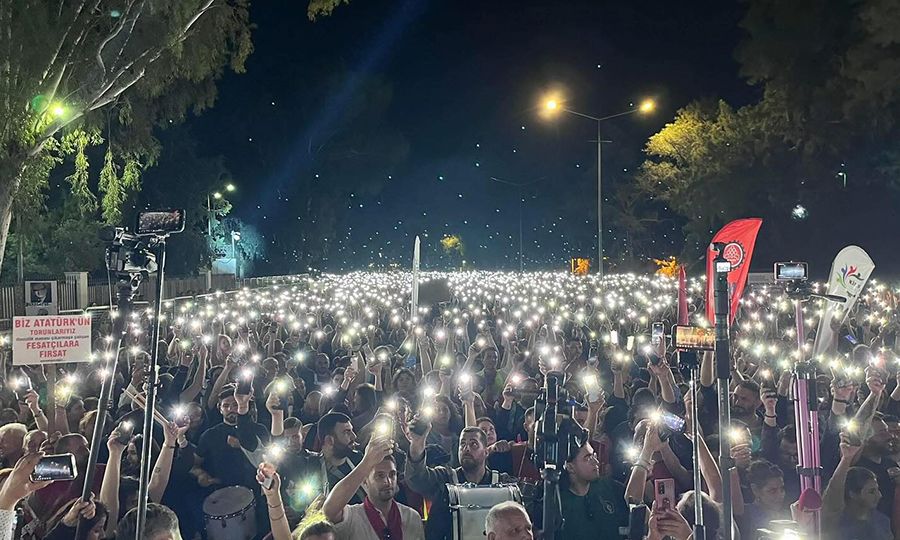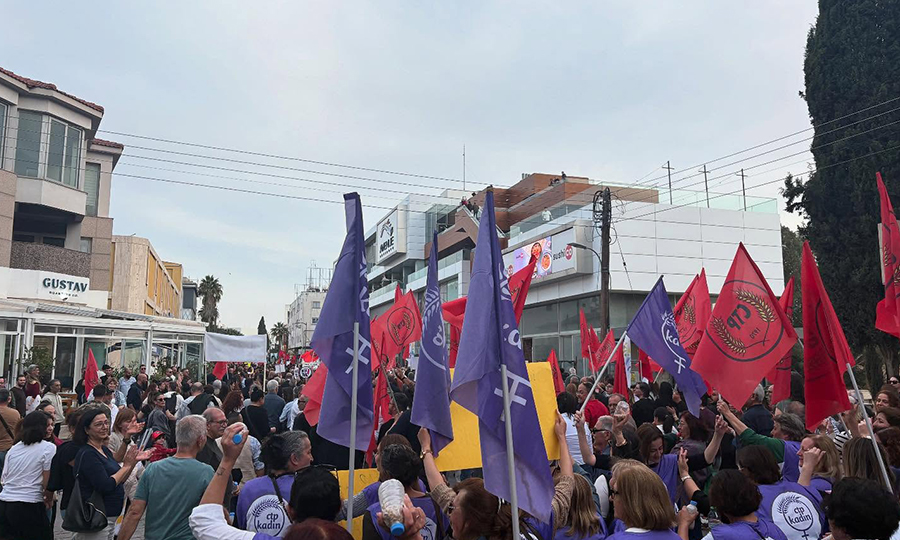
Newsroom
A surge of anger and resistance swept through occupied Nicosia this week as thousands of Turkish Cypriots took to the streets, pushing back against a controversial new regulation that makes the wearing of headscarves compulsory in schools. The decision, handed down by Turkey, has triggered widespread backlash in the occupied north, with protestors denouncing what they see as a direct assault on their secular way of life.

Chanting “Cyprus is secular, and it will remain!” and “Ankara, take your hands off us,” demonstrators flooded the capital’s streets Tuesday night under the rallying cry “It will not pass.” The protest march, which drew support from more than 40 unions, civic groups and political parties, wound its way past symbolic institutions of power, from the so-called “presidency” to the Turkish “embassy”, in a powerful display of grassroots defiance.
Placards bore witty and pointed slogans like “Don’t cover the children—close the imam hatips,” referencing Turkey’s religious schools, and “Pikachu would’ve come, but the electricity was cut,” mocking the island’s frequent power outages while calling out broader socio-political issues. Others bluntly declared: “Impositions and impoverishment will not pass.”
The event had no shortage of high-profile attendees. Former Turkish Cypriot leader Mustafa Akıncı was joined by political veterans Serdar Denktaş, Tufan Erhürman, Kudret Özersay and Zeki Çeler. Their presence reinforced the message: this wasn’t just a protest against a dress code, it was about autonomy, identity and resistance to creeping authoritarianism.

“Don’t Preach to Us”
Tensions ran high during a fiery speech by Ahmet Serdaroğlu, head of the Free Trade Unions Federation. He blasted the hypocrisy of those backing the new rule, saying, “Those involved in corruption and theft can’t teach us about religion. I am a Muslim. I don’t need anyone violating rights to tell me how to live as one.”
But his remarks didn’t land well with everyone. His claim that anyone opposing the protest was betraying Turkish Cypriot values sparked a brief stage-side squabble with Serdar Denktaş and Izzet Izcan, one that was quickly defused but revealed the raw divisions within the community.
Serdaroğlu didn’t stop there; he publicly renounced support for the current Turkish Cypriot leader, Ersin Tatar, ahead of the upcoming “presidential” elections. “The Turkish Cypriot people need a real leader,” he declared, invoking the memory of the late Rauf Denktaş and Fazıl Küçük. “Peace in Cyprus cannot be stopped.”
A Response from the Other Side
Not everyone is happy with the wave of protests. Erhan Arıklı, head of the far-right Renaissance Party and the “transport minister” in the occupied north, condemned the demonstration as “disrespectful.” Without skipping a beat, he announced a counter-rally titled “Respect for Turkey,” scheduled for the following day.
Meanwhile, Turkish state-aligned media defended the regulation and zeroed in on what they view as a necessary moral and cultural correction in the occupied north. But for many Turkish Cypriots, the issue isn’t about religion; it’s about being treated as a colony.
Academic Nikos Moudouros, speaking on local radio, said the protests reflect a deepening anxiety about Turkey’s direction under its current leadership. “The Turkish Cypriot community is sounding the alarm,” he said. “They see what’s happening in Turkey and are building their defenses before it’s too late.”
Öğretmen sendikalarının eyleminde on binlerce kişi "Kıbrıs laiktir laik kalacak!" sloganı attı.
— Kıbrıs Postası (@kibris_postasi) April 8, 2025
Video: Ali Kişmir#kktc #lefkoşa #öğretmenler #eylem pic.twitter.com/vvyefd2MwY































